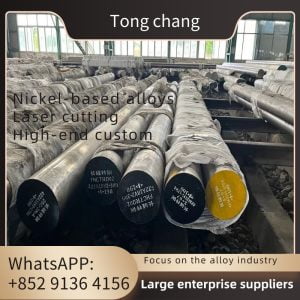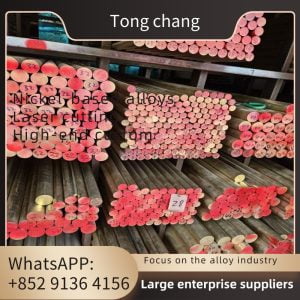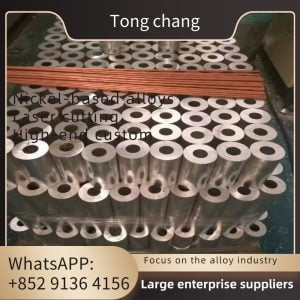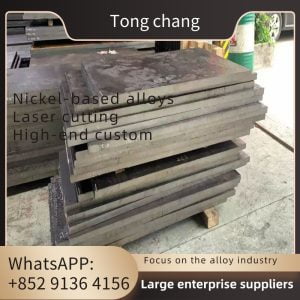| Type: | Seamless,Welded,round Pipe / Tube | Welding Line Type: | Seamless,ERW,Spiral Welded,EFW |
|---|---|---|---|
| Certification: | ISO,SGS,BV,ISO & SGS,ISO/CE/SGS | Thickness: | 1mm-60mm |
| Length: | 6 Meters Or Customized | Application: | Construction,electric |
ASTM B861 GR.2 Titanium Alloy Steel Heat Exchanger Electric Appliance
ASTM B861/2 GR.7 Corrosion Resistance:
Titanium has strong corrosion resistance in various media, especially in neutral and oxidizing media. It can also be used in some dilute reducing acids, such as various concentrations of nitric acid at constant temperature up to the boiling point. It has good corrosion resistance to most alkaline solutions, such as Barium hydroxide, Calcium hydroxide and Magnesium hydroxide saturated solutions at room temperature, but can not be used for boiling sodium hydroxide solution. Titanium is completely non corrosive in seawater and is also highly resistant to corrosion in most organic acids (except for formic acid and oxalic acid). It has excellent corrosion resistance in wet chlorine, Chlorite, Hypochlorite and other chloride solutions. The corrosion resistance in sodium chloride solution increases with the increase of solution pH value
The specific strength of titanium tube is high:
The density of titanium alloy is generally about 4.5g/cm3, only 60% of steel, the strength of pure titanium is close to the strength of ordinary steel, and some high-strength titanium alloys exceed the strength of many alloy structural steel. Therefore, the specific strength (strength/density) of titanium alloy is much higher than that of other metal structural materials, and components with high unit strength, good rigidity and light weight can be produced. At present, titanium alloys are used in aircraft engine components, skeletons, skins, fasteners and landing gear.
Titanium tube has high thermal strength:
The use temperature is several hundred degrees higher than that of aluminum alloy, and the required strength can still be maintained at moderate temperatures, and it can work for a long time at a temperature of 450 ~ 500 ° C. These two types of titanium alloys still have a high specific strength in the range of 150 ° C to 500 ° C, while the specific strength of aluminum alloys decreases significantly at 150 ° C. The operating temperature of titanium alloy can reach 500℃, and that of aluminum alloy is below 200℃.
The corrosion resistance of titanium tube is good:
Titanium alloy works in humid atmosphere and seawater medium, its corrosion resistance is much better than stainless steel; Resistance to pitting corrosion, acid corrosion, stress corrosion is particularly strong; Excellent corrosion resistance to alkali, chloride, chlorine, nitric acid, sulfuric acid, etc.
Titanium tube has good low temperature performance:
Titanium alloy can still maintain its mechanical properties at low and ultra-low temperatures. Titanium alloys with good low temperature performance and very low gap elements, such as TA7, can maintain a certain plasticity at -253 ° C. Therefore, titanium alloy is also an important low-temperature structural material.
Titanium tubes have high chemical activity:
Titanium has a large chemical activity and produces a strong chemical reaction with O, N, H, CO, CO2, water vapor, ammonia and so on in the atmosphere. When the carbon content is greater than 0.2%, hard TiC will be formed in titanium alloy; When the temperature is higher, TiN hard surface will be formed by the interaction with N. Above 600℃, titanium absorbs oxygen to form a hardened layer with high hardness; The embrittlement layer is also formed when the hydrogen content increases. The chemical affinity of titanium is also large, and it is easy to adhere to the friction surface.
The thermal conductivity and elastic modulus of titanium tube are small:
The elastic modulus of titanium alloy is about 1/2 of steel, so its rigidity is poor, easy to deform, it is not suitable to make slender rods and thin-walled parts, and the amount of rebound of the machining surface during cutting is very large, about 2 to 3 times that of stainless steel, resulting in severe friction, adhesion and adhesive wear of the tool after the tool surface.
ASTM B861/2 GR.7 Application Area:
Aerospace, plate heat exchangers, bellows expansion joints, seawater desalination, desulfurization and denitrification, chemical equipment, etc
General introduction
| Item Name | Grades | Standard | Dimension (MM) | Application |
| Titanium Pipe | Gr1 Gr2 Gr3 Gr7 Gr9 Gr12 Gr16 Gr17 3.7025 3.7035 3.7235 3.7195 3.7105 BT1-00 BT1-0 | ASTM B337 B338 B861 B862 ASME SB338 ASME SB337 ASME SB861 SB862 DIN17861 | Φ10-Φ114 x0.4-10x 100-15000 MM | heat exchanger coil pipe Condenser petroleum pipeline Sea farming Evaporimeter Fluid Transporation Piping etc. |
Chemical Composition Element(Weight %)
| Composition | Grade1 | Grade2 |
| Carbon | 0.65–1.10 | 0.75–1.15 |
| Manganese | 1.50 max | 1.50 max |
| Silicon | 14.20–14.75 | 14.20–14.75 |
| Chromium | 0.50 max | 3.25-5.00 |
| Molybdenum | 0.50 max | 0.40-0.60 |
| Copper | 0.50 max | 0.50 max |
| Other Trade Name | Cp Titanium Grade 2, Cp Gr2 Titanium |
| Specification and Grade | ASTM B 337 ASME SB 337 / ASTM B 338 ASME SB 338 / ASTM B861 / B862 |
| Sizes Available | ½” to 24”NB in Sch 10s, 40s, 80s, 120, 160s, XXS. |
| Frequently Used Types | Seamless / ERW / Welded / Fabricated |
| Forms Available | Round, Hydraulic Etc |
| Lengths | Cut to size |
| Pipe End Forming | Treaded Both Ends, Plain Both Ends, Beveled end, Bevel small end, Bevel one end, Bevel large end, Bevel both ends, Plain One End, Treaded One End, Beveled One end |
| Melting Point | 1665 °C (3030 °F) |
| WERKSTOFF NR. | 3.7035 |
| UNS | R50400 |








